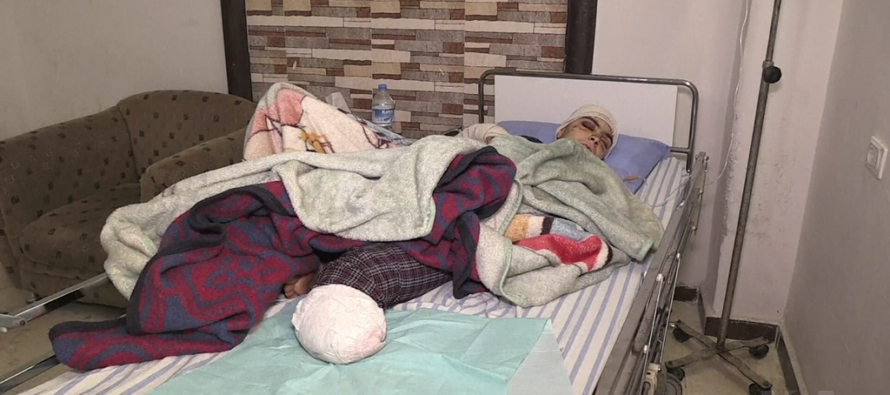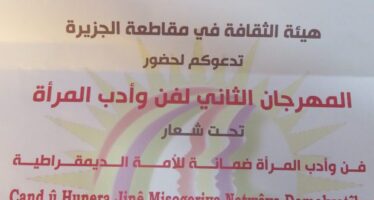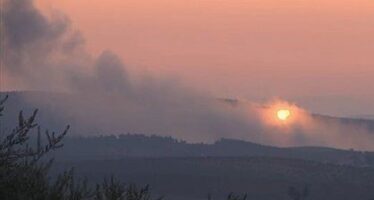CAN THERE BE A (SAFE) FUTURE FOR ROJAVA?

![]()
“The way we freed Afrin, we will save other lands of northern Syria [such as] Manbij, Ayn al-Arab, Tel Abyad from the cruelty of separatist [YPG/PKK] terrorist organization,” Erdoğan said at a graduation ceremony of Gendarmerie and Coast Guard Academy in the capital Ankara.
“Now, they are digging trenches around Manbij,” Erdoğan said, referring to the terrorist group YPG/PKK. “They are digging their own graves,” he added.
“Apparently, they will not leave a lot of work for us.” the Turkish President said (Oct 27, 2018)
In regards to the dangerous situation currently facing the Kurdish people in Rojava / the Democratic Federation of Northern Syria, waiting tensely to see what Turkish President Recep Tayyip Erdoğan’s next move will be, it might be of benefit – for those committed to increasing public awareness (through the various social media) of Turkey’s current belligerent position in relation to the Kurdish ‘experiment’ in radical social democracy – to review the recent interview given to Kurdistan 24’s correspondent Akram Saleh by Aldar Xelil, the Diplomatic Relations spokesperson for the Movement for a Democratic Society (TEV-DEM), the main council governing Syria’s predominantly Kurdish area (Rojava)…
The interview was held in Qamishlo, the de-facto capital of the Democratic Federation of Northern Syria, on November 5th to “explain the recent Turkish attacks on Syria’s northern region which the Kurdish-led, US-backed Syrian Democratic Forces (SDF) hold.”
Some of the important issues affecting a future for the region were: the attitude of the major powers intervening in Syria, the reasons for Turkey’s attacks, the U.S. stance, and talks with the Syrian regime.
Thus, in a number of headings, Aldar Xelil put into perspective Turkish aggression and its impact on the people in northern Syria.
TURKISH ATTACKS EAST OF THE EUPHRATES
Turkey’s belligerent attitude towards the Kurds and their supporters and its military attacks on Rojava is nothing new, Aldar Xelil explained:
“Since 2011, Turkey has established its policy and attitudes clearly toward Rojava, saying they should prevent the experience of Bashur [the Kurdistan Region], or what they call North Iraq, to be repeated in north Syria…
“Turkish leaders then said when the Kurds in north Iraq started establishing their experience, it was Turkey’s big fault because it did not intervene, and today there is a Kurdish region.”
…So in Kobane, Jarabulus, al-Bab and Afrin
“Since then [2011], Turkey is attacking us constantly, starting with the media and ending with military attacks, especially during the Kobani battle when it reached its climax where IS was sent and supported by Turkey…
“The resistance in Kobani was contrary to Erdogan’s expectations, as IS at that time had gained [ground] in Mosul and Shingal and later in the south of Hassakah, Kazwan mountain, Raqqa, and Ain Issa…
“Since then, Erdogan has not forgotten this loss and is working to resume his plans by implementing the plans of IS which failed…
“To implement their plans, Turkey attacked Jarabulus and al-Bab, and then attacked Afrin.”
THE WORLD POWERS’ GIVE THE GREEN LIGHT
Whether it is the U.S. Russia, Iran, France, or Germany:
“If those powers had taken any positive stance and signed any agreements with Turkey to find a solution, Turkey would not dare to wage its recent attacks.
“There is a fact that we should remember and realize all the time: our revolution will carry on through our hands, not through others, and if we wait for others, we will not achieve any victory…
“The world and the regional powers do not care about the revolution in north Syria if it does not serve their interests…
“If there were any element in their agenda in favor of finding a solution in Syria, Turkey would not dare to launch the attacks.”
Despite this Xelil added:
“We are exerting efforts for rapprochement between these interests by increasing the level of our own interests and not ignoring their interests at the same time.”
HOW TO RESPOND TO THESE MILITARY THREATS?
“We have never attacked anybody, but we should be ready for any attack against us…
“We should realize the fact that defending ourselves is a right for anybody, but if our people just watch and wait for others to protect them and build a home for them, nothing will happen.
“When we say the [People’s Protection Units] YPG will resist, we are talking about the military aspect only, and this is not balanced at all because the other side has much more military force…”
In the interview Xelil concluded that if Turkey continues its military attacks “the solution would not be to use military force only. Instead… all nations who are involved in the resistance would take part to find a solution, including in diplomatic, political, financial, and even cultural aspects.”
He pointed out that people in north Syria should organise resistance to Turkey’s aggression also through the media and “raising the region’s voice to influence the world public opinion.”
With this in mind it would be worth asking how many citizens in the 29 countries that make up Turkey’s NATO allies would actively support Turkey’s policy of extending the war in Syria as well as its relentless and ongoing attack on the Kurds and its refusal to even consider dialogue or a peace building process?
WOULD THE AFRIN EXPERIENCE BE REPEATED?
“…If people in all parts of Kurdistan [Bashur, Bakur, and Rojhilat] and Kurds all over the world are involved in media activities and make their voice clear to the world, then there will be pressure on any force against them…
“But if everybody just watches and remains silent, of course, Erdogan will find it easy and ready to attack and implement his plans.”
Xelil also added that the conditions in Afrin early in the year and now, east of the Euphrates “are different in many aspects, primarily military and political.” Likewise the Turkish economy has deteriorated and Recep Tayyip Erdoğan is aware what effect this may have on the upcoming elections in March 2019.
“So, Erdogan is creating external problems to cover the internal ones and make Turkish public opinion busy with external issues in order to distract them from the internal problems.”
A point also recently made by Turkey’s pro-Kurdish People’s Democratic Party (HDP):
“As local elections on March 31 draw nearer President Erdoğan once again puts forth pro-war and Middle East policies that he has used to consolidate nationalist voters.”
AMERICA REJECTS TURKISH ATTACKS ON ROJAVA?
“They are saying this, but we cannot depend on these words and sit, and rely on it…They should pressure them [Turkey]; the US just saying to Turkey it’s not acceptable will not work…
“We have to make our own preparations and make our own decision to resist.”
Again, the role of public opinion is important in encouraging the U.S. administration to stand up to Turkey’s aggression.
“There might not be any serious decision taken in Washington, but if we make efforts and raise our issue to the level of world public opinion, then the Americans will be obliged to make a decision and take action.”
THE U.S. & A POLITICAL SOLUTION
“To the best of our knowledge, the US administration is trying to include the post-IS political solution in their agenda… Thus, when the US political project is involved in their agenda, they know well that the political solution is impossible without us.
“Who is left in Syria? It’s us, the regime, and the forces controlling Idlib…It is expected that the forces controlling Idlib will be eliminated as well, so again who is left? It’s us and the regime.
“So, if we are not there, with whom shall the Syrian regime seek a solution?
“Actually, the Americans are trying to include us in any process or dialogue, but we do not know whether they will fulfill their promises or not… However, the reality and fact are that if the representatives of north Syria, including Rojava, are excluded, then no agreement or solution is going to be made.”
TALKS WITH THE SYRIAN REGIME
Earlier talks that had taken place with the Syrian regime “have currently stopped, with no sign of resuming.”
“The Syrian regime has expected us to agree to what they impose on us, such as some articles in the old constitution or to confine the matter to some cultural rights…Unfortunately, the Syrian regime’s attitude toward the Kurds has not changed, and it’s still the same as it was before the crisis.
“Their discourse toward us is still the old one, like saying we are all Syrian citizens and they can offer us an hour of Kurdish lessons per week in their universities, without discussing any matters related to the political system or the constitution…
“The regime never discussed the fundamental issues, like why the country has been destroyed and why there has been a war for over seven years, and what’s wrong with the current system…”
That said:
“But, anyway, we should not stop our attempts for dialogue as we are always ready and we should work to seek a solution with the regime.”
TURKISH THREATS SERVE THE SYRIAN REGIME
“Here I can say that there is some kind of agreement between the Turks and the Syrian regime, but through a catalyst, which is Russia, which is directing Turkey to our region…
“Russia asks Turkey to hit us, so we will be pushed toward the Syrian regime and resort to it.
“Turkey helped the Syrian regime by preparing Afrin to receive people from Ghouta… Now, negotiations for Idlib will be in favor of the regime as well, and it seems that even the Adana Treaty between the Syrian regime and Turkey in 1998 is still working” Aldar Xelil, the Diplomatic Relations spokesperson for the Movement for a Democratic Society (TEV-DEM), concluded.
In this complex and ever changing situation, it is imperative that world opinion (that is, our own voices as opposed to those of the so-called ‘leaders’ of the various intervening countries when they meet in their rarefied environments) send a clear message that the Syrian people, including the Turkish people, the Kurds, and all the other minorities living in the region, have had enough of war, of mayhem and bloodshed and it is the responsibility of these leaders and the international community to work towards peaceful outcomes so all the peoples in this region… whether they are Turks, Kurds, Yazidis, Arabs, Turkmen, Circassions, Christians, Muslims, Jews, Druzes, Assyrians, Syriacs, Armenians… all peoples… can see a future for their children.
séamas carraher
Link
Image
A civilian wounded by the Turkish airstrikes on Afrin.
Zlatica Hoke (VOA) [Public domain], via Wikimedia Commons
Related Articles
Women’s Art and Literature Festival in Qamishlo
![]()
The war in the whole of Syria is raging, yet in Rojava people keep implementing the Democratic Autonomy in all spheres of life
The idea of ‘empire and peace’
![]()
NURAY MERT It has long been claimed that the biggest obstacle in front of the Kurdish issue is the so-called
WAR ON AFRIN: THE SECOND WEEK
![]()
We are now two weeks into the Turkish military – supported by the paramilitary groups of the Free Syrian Army (“al-Qaida & al-Nusra terrorists” ANF) – assault on Afrin




